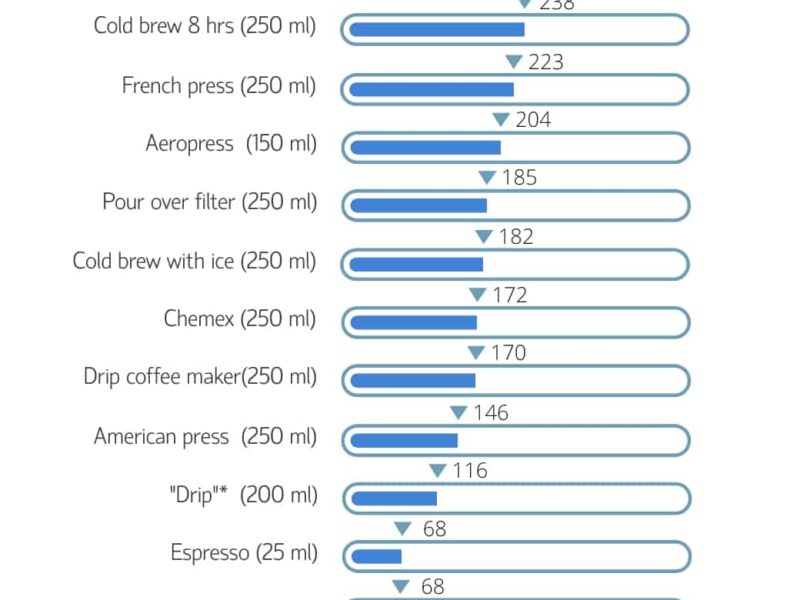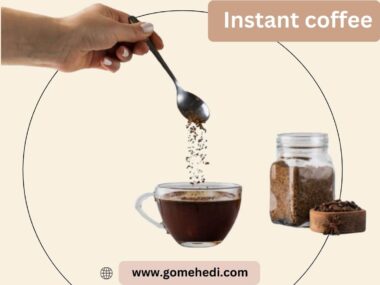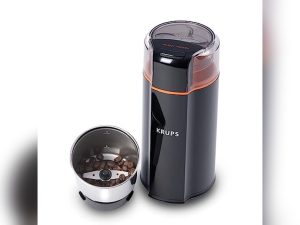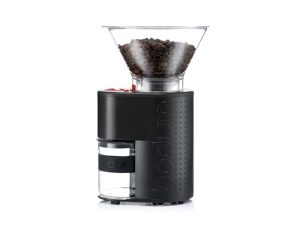How much caffeine is in your filter coffee? It’s a question that might pop into your head as you sip on your morning brew.
Coffee is a beloved ritual for millions, but have you ever stopped to think about how much caffeine you’re actually consuming? Understanding the caffeine content in your cup can help you make informed choices for your health and lifestyle. Whether you’re looking to boost your energy levels or moderate your intake, knowing the caffeine levels can guide you in the right direction.
Stick around to uncover the details and make your coffee experience even more enjoyable.
Caffeine Content In Filter Coffee
Filter coffee is a favorite morning ritual for many. It offers a rich, aromatic flavor. But how much caffeine does it actually contain? Understanding the caffeine content can help coffee lovers manage their daily intake. Let’s delve into the specifics of caffeine in filter coffee.
Caffeine Content In A Standard Cup
A standard cup of filter coffee contains about 95 mg of caffeine. The amount can vary depending on the coffee beans and brew time. Some cups might have more; others less. But 95 mg is a good average to start with.
Several factors influence caffeine levels in filter coffee. The type of coffee beans is crucial. Arabica beans generally have less caffeine than Robusta beans. Brewing time also plays a role. The longer the coffee brews, the more caffeine it extracts.
Comparing With Other Coffee Types
Filter coffee has a moderate caffeine content. Espresso, for example, has more caffeine per ounce. But a cup of filter coffee has more caffeine overall. This is due to its larger serving size. Instant coffee usually has less caffeine than filter coffee.
Health Considerations
Moderate caffeine intake can have health benefits. It can improve focus and alertness. But too much caffeine might lead to restlessness or anxiety. Knowing the caffeine content in your filter coffee can help you enjoy it responsibly.
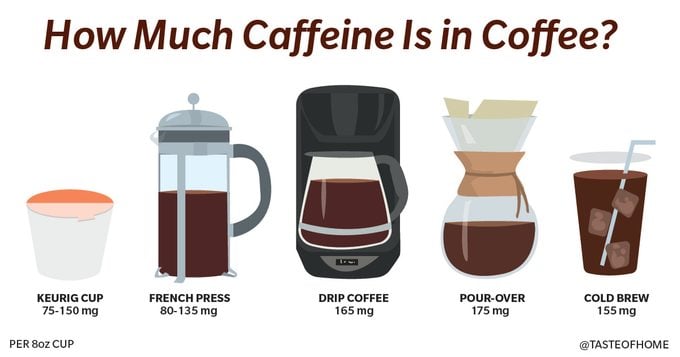
Credit: www.tasteofhome.com
Factors Affecting Caffeine Levels
Understanding how much caffeine is in your filter coffee can be a bit of a puzzle. Several factors influence the caffeine levels in your cup, and knowing these can help you customize your coffee experience. Whether you’re trying to cut down on caffeine or need that extra kick, these insights can be incredibly useful.
Coffee Bean Variety
The type of coffee bean you choose makes a significant difference. Arabica beans are commonly used and tend to have less caffeine than Robusta beans. Imagine you’re at a coffee shop, eyeing different blends. Knowing your beans can help you choose wisely for your caffeine needs.
Robusta beans might be the go-to for those needing a stronger jolt. On the other hand, Arabica beans offer a smoother taste with less caffeine. Next time you’re buying coffee, consider asking about the bean variety.
Brewing Time
The duration you brew your coffee also affects caffeine content. Longer brewing times usually result in higher caffeine levels. Think of it like steeping tea; the longer it steeps, the stronger it gets.
If you prefer a mild cup, you might want to shorten the brewing time. But if you’re pulling an all-nighter, let that coffee brew a little longer. How do you usually decide on your brewing time?
Grind Size
The grind size of your coffee can alter its caffeine strength. Finer grinds tend to produce coffee with more caffeine because they allow more surface area for extraction. It’s like how cutting veggies into smaller pieces helps them cook faster.
Experiment with your grind size to find what suits your taste and caffeine preference. If you’re using a grinder, try adjusting the settings and see the impact on your coffee. What grind size do you usually use?
These factors give you control over the caffeine levels in your filter coffee. Adjusting each one can lead to a cup that perfectly fits your needs. Next time you brew, think about these elements and see how they change your experience.
Comparing Caffeine In Different Coffee Types
When choosing your daily brew, understanding the caffeine content can be crucial. Filter coffee, espresso, and instant coffee each have distinct characteristics and caffeine levels. This section will explore how these coffee types stack up against each other, helping you make informed choices for your caffeine fix.
Espresso Vs Filter Coffee
Espresso is often perceived as the stronger option. But is it really? A single shot of espresso contains about 63 mg of caffeine. Meanwhile, a cup of filter coffee generally has around 95 mg of caffeine. Surprised? The difference stems from the brewing process and serving size. Espresso is concentrated, while filter coffee is diluted with more water. Next time you’re deciding between these two, consider how much caffeine you truly want.
Instant Coffee Vs Filter Coffee
Instant coffee is a convenient option for many. But how does its caffeine content compare? Instant coffee typically contains 60 to 80 mg of caffeine per cup. Filter coffee, on the other hand, averages at 95 mg per cup. While instant coffee might be easier to prepare, filter coffee delivers a stronger caffeine punch. Think about your energy needs when choosing between these options.
Have you ever felt that your coffee wasn’t giving you the boost you needed? It might be time to reconsider your brew type. Understanding these differences can help you tailor your coffee choice to your lifestyle and caffeine needs. Which type will you choose for your next cup?
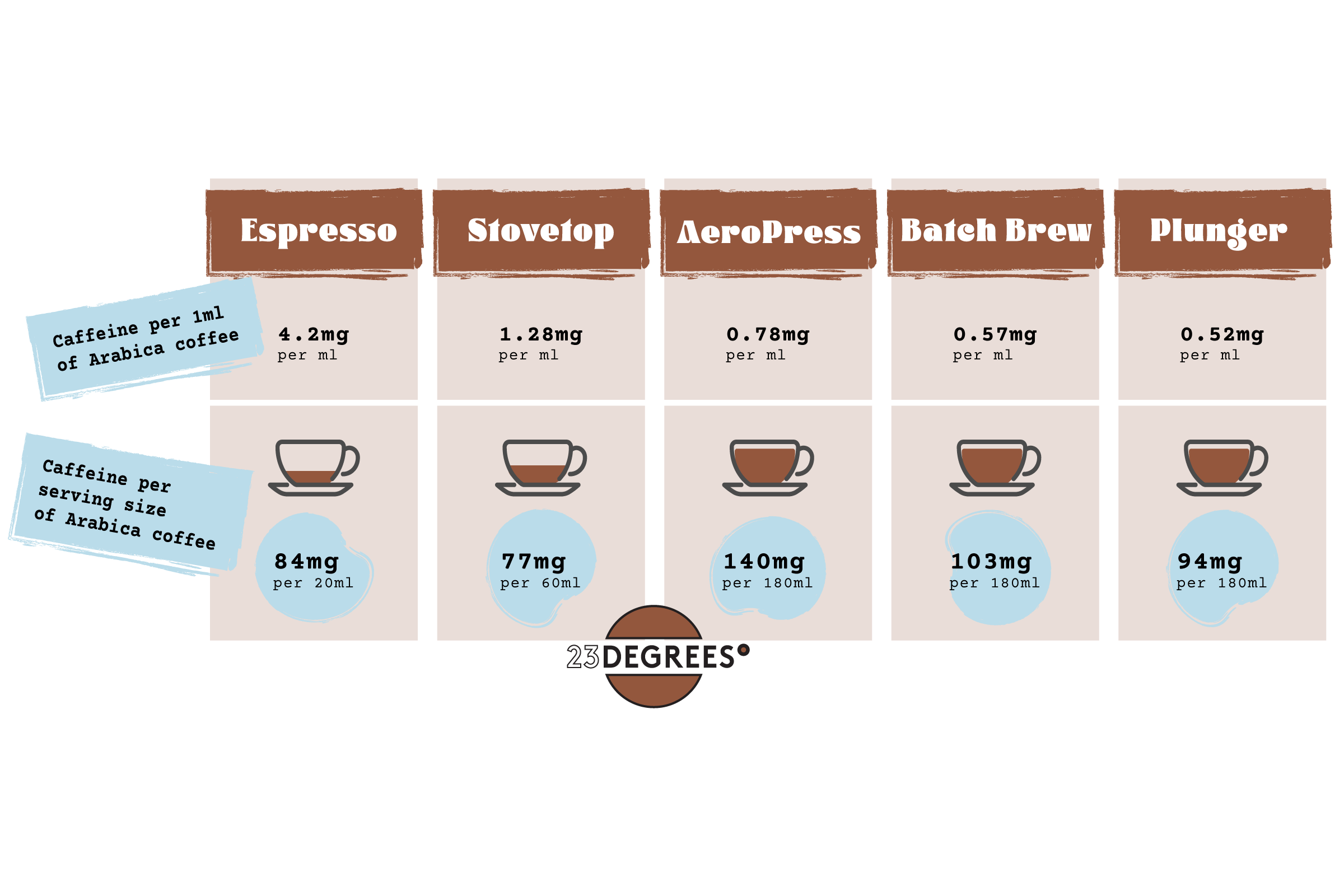
Credit: www.23degrees.com.au
Health Implications Of Caffeine Consumption
Caffeine is a natural stimulant found in filter coffee. Understanding its health implications is crucial for coffee lovers. Moderate caffeine intake offers several benefits. Yet, overconsumption poses risks. This section explores both aspects.
Benefits Of Moderate Intake
Moderate caffeine consumption boosts mental alertness. It enhances concentration and keeps fatigue at bay. Caffeine can improve physical performance. It stimulates the central nervous system. This leads to increased endurance during workouts. Moderate caffeine helps in weight management. It boosts metabolism, aiding calorie burning. Regular coffee drinkers report improved mood. Caffeine stimulates the release of dopamine. This neurotransmitter is associated with pleasure.
Risks Of Overconsumption
Excessive caffeine can lead to anxiety. It may cause jitters and restlessness. High intake disrupts sleep patterns. Insomnia can result from too much caffeine. Overconsumption may lead to heart issues. Elevated heart rates and palpitations are possible. Digestive problems can arise from caffeine abuse. Stomach upset and acid reflux are common. Pregnant individuals should limit caffeine. It poses risks to fetal development.
Tips For Managing Caffeine Intake
Managing caffeine intake can boost your health. Too much caffeine may cause jitters. It can also disturb your sleep. Learning how to control your caffeine intake is key. Here are a few tips to help you manage it effectively.
Alternatives To Coffee
Consider herbal teas. They are caffeine-free. They come in many flavors. Chamomile and peppermint are popular choices. Decaf coffee is another option. It tastes like regular coffee. But, it has less caffeine. Try hot water with lemon. It’s refreshing and caffeine-free.
Monitoring Your Consumption
Track your caffeine intake daily. Use a journal or an app. Note how much coffee you drink. Include other sources like tea or sodas. Check labels on energy drinks. They often have high caffeine levels. Stay aware of hidden sources. Chocolate and certain medications contain caffeine too.

Credit: www.roastycoffee.com
Popular Myths About Coffee
When you think about coffee, what comes to mind? The rich aroma wafting through your kitchen, or perhaps the comforting warmth of a mug cradled in your hands? Coffee is more than just a beverage; it’s a global phenomenon surrounded by numerous myths. These myths can lead to misconceptions about your daily cup of joe, especially when it comes to caffeine content. Let’s debunk some popular myths about coffee and clarify the truth behind them.
Decaffeinated Coffee Myths
Decaffeinated coffee isn’t caffeine-free. Many people believe decaf coffee contains no caffeine at all, but that’s not the case. Though it undergoes a process to remove most of the caffeine, a small amount remains. Surprisingly, a cup of decaf can have anywhere from 2 to 15 milligrams of caffeine.
Does decaf taste different? Another myth is that decaf coffee lacks flavor compared to regular coffee. The truth is, the decaffeination process can affect the taste, but high-quality decaf can be as flavorful as its caffeinated counterpart. Have you ever tried different brands to taste the difference yourself?
Caffeine Addiction Myths
Are you addicted to caffeine? The idea that caffeine is highly addictive is a common myth. While caffeine can cause mild dependency, it’s not addictive in the same way substances like nicotine or alcohol are. Most people can manage their intake without serious withdrawal symptoms.
Does caffeine impact your health negatively? Some believe caffeine is harmful to your health. In moderation, caffeine can actually be beneficial, boosting alertness and concentration. However, balance is key. Have you ever noticed how caffeine affects your energy levels throughout the day?
Understanding these myths can help you make informed decisions about your coffee habits. Next time you sip on your favorite brew, ask yourself: are the myths influencing your choices?
Frequently Asked Questions
Does Filter Coffee Have A Lot Of Caffeine?
Filter coffee typically contains a moderate amount of caffeine. Its caffeine level depends on brew strength and serving size. Generally, filter coffee has less caffeine than espresso but more than instant coffee. Enjoying filter coffee offers a balanced caffeine boost without overwhelming your system.
Is 200 Mg Of Caffeine A Lot?
200 mg of caffeine is moderate for most adults. It boosts energy and alertness. Always consider individual tolerance levels.
Is Filter Coffee Stronger Than Regular Coffee?
Filter coffee can be stronger than regular coffee, depending on brewing method and coffee-to-water ratio. Filter coffee typically uses a higher coffee-to-water ratio, resulting in a richer flavor. The strength also depends on the type of beans and grind size used.
Adjust these factors for your preferred strength.
How Much Caffeine Is In 1 Cup Of Filter Coffee?
A cup of filter coffee typically contains around 80 to 100 milligrams of caffeine. The exact amount can vary based on factors like coffee blend and brewing time. Choose quality beans and enjoy a moderate caffeine boost without overwhelming your system.
Always check specific brands for precise caffeine content.
Conclusion
Understanding caffeine in filter coffee helps make informed choices. Coffee lovers often seek that perfect balance. Knowing caffeine content aids in managing daily intake. Different factors influence caffeine levels. Coffee type, brewing time, and grind size matter. Each cup can vary in strength.
So, enjoy your coffee mindfully. It’s about savoring the experience. Small adjustments can enhance your coffee routine. Now, you’re ready to explore the world of filter coffee with confidence. Cheers to a delightful coffee journey!

